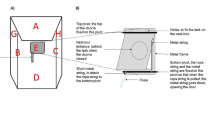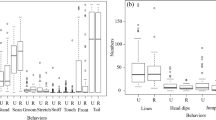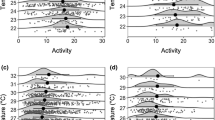Abstract
Group-level behavior has important fitness consequences for group-living fish, which might be affected by the personalities of group members. However, the role of group personality on group behavior has seldom been systematically investigated. To test the effect of the personalities of group members on shoaling behavior and the underlying mechanisms, we investigated the activity and boldness personality traits in qingbo (Spinibarbus sinensis) and grouped qingbo shoals into high personality score, low personality score, and randomly selected control groups and measured the shoal-level behavior traits. Compared with the reactive shoal (low activity and boldness), the proactive (high activity and boldness) shoal showed high activity and increased synchronization of speed, suggesting that the shoal-level behavior was affected by the personalities of the shoal members. Interestingly, the variables in the control shoal were midway between those in the high- and low-activity shoals, suggesting that the average activity score might be the most important factor for group-level behavior (average-determined mechanism). However, when qingbo were divided into high- and low-boldness shoals, the control shoal variables were similar to those of the low-boldness shoals, suggesting that a minority of low-boldness individuals might have a dominant effect on shoal-level behavior (minority-determined mechanism). Cohesion showed a more complicated pattern than the other variables, which might be because the conformity of personalities among shoal members had a profound effect on cohesion. This finding suggests that large interindividual differences in personality play a profound effect on group-level behavior, and different mechanisms might provide the precondition for shoals to exhibit great shoal-level diversity. These findings might have important ecological relevance for the survival of group-living fish in habitats with food resource and predation intensity fluctuations.




Similar content being viewed by others
Abbreviations
- PTM:
-
Percent time moving
- TDM:
-
Total distance moved
- PTMgroup :
-
PTM of the four shoal members
- IID:
-
The interindividual distance
- SV:
-
The synchronization of speed
- ICC:
-
The intraclass correlation coefficient
References
Alain P, Anthony S, Marie-Laure B, Yannick L, Fabrice T, Pascal F (2015) First insight into personality traits in northern pike (Esox lucius) larvae: a basis for behavioral studies of early life stages. Environ Biol Fish 99:105–115
Brown C, Irving E (2014) Individual personality traits influence group exploration in a feral guppy population. Behav Ecol 25:95–101
Budaev SV, Mikheev VN, Pavlova DS (2015) Individual differences in behavior and mechanisms of ecological differentiation on the example of fish. Biol Bull Rev 5:462–479
Cote J, Fogarty S, Weinersmith K, Brodin T, Sih A (2010) Personality traits and dispersal tendency in the invasive mosquitofish (Gambusia affinis). Proc R Soc B Biol Sci 277:1571–1579
Cote J, Fogarty S, Brodin T, Weinersmith K, Sih A (2011) Personality dependent dispersal in the invasive mosquitofish: group composition matters. Proc R Soc B Biol Sci 278:1670e1678
Delcourt J, Poncin P (2012) Shoals and schools: back to the heuristic definitions and quantitative references. Rev Fish Biol Fisher 22:595_619
Dyer JRG, Johansson A, Helbing D, Couzin ID, Krause J (2009) Leadership, consensus decision making and collective behaviour in humans. Philos Trans R Soc Lond Ser B Biol Sci 364:781–789
Fu SJ (2016) The effects of group size on schooling behavior in two cyprinid fish species. Aquat Biol 25:165–172
Harcourt JL, Ang TZ, Sweetman G, Johnstone RA, Manica A (2009) Social feedback and the emergence of leaders and followers. Curr Biol 19:248–252
Heg D, Schürch R, Roghenberger S (2011) Behavioral type and growth rate in a cichlid fish. Behav Ecol 22:1227–1233
Herbert-Read JE, Perna A, Mann RP, Schaerf TM, Sumpter DJT, Ward AJW (2011) Inferring the rules of interaction of shoaling fish. PNAS 108:18726–18731
Ioannou CC, Dall SRX (2016) Individuals that are consistent in risk-taking benefit during collective foraging. Sci Rep 6:33991
Jolles JW, Fleetwood-Wilson A, Nakayama S, Stumpe MC, Johnstone RA, Manica A (2015) The role of social attraction and its link with boldness in the collective movements of three-spined sticklebacks. Anim Behav 99:147–153
Jolles JW, Boogert NJ, Sridhar VH, Couzin ID, Manica A (2017) Consistent individual differences drive collective behavior and group functioning of schooling fish. Curr Biol 27:2862–2868
Jolles JW, Laskowski KL, Boogert NJ, Manica A (2018) Repeatable group differences in the collective behaviour of stickleback shoals across ecological contexts. Proc R Soc B Biol Sci 285:20172629
Killen SS, Fu C, Wu QY, Wang YX, Fu SJ (2016) The relationship between metabolic rate and sociability is altered by food deprivation. Funct Ecol 30:1358–1365
Krause J, Ruxton GD (2002) Living in groups. Oxford University Press, New York
Le Galliard JF, Paquet M, Cisel M, Montes-Poloni L (2013) Personality and the pace-of-life syndrome: variation and selection on exploration, metabolism and locomotor performances. Funct Ecol 27:136–144
Liu S, Fu SJ (2017) Effects of food availability on metabolism, behaviour, growth and their relationships in a triploid carp. J Exp Biol 220:4711–4719
Mazué GPF, Godin JGJ (2015) Boldness-exploration behavioural syndrome: interfamily variability and repeatability of personality traits in the young of the convict cichlid (Amatitlania siquia). Behav Ecol 26:900–908
Miller N, Gerlai R (2012) Automated tracking of zebrafish shoals and the analysis of shoaling behavior. In: Kalueff AV, Stewart AM (eds) Zebrafish protocols for neurobehavioral research. Humana Press, New York, pp 217–230
Pérez-Escudero A, Vicente-Page J, Hinz RC, Arganda S, de Polavieja GG (2014) idTracker: tracking individuals in a group by automatic identification of unmarked animals. Nat Methods 11:743–748
Planas-SitjàI, Nicolis SC, Sempo G, Deneubourg J-L (2018) The interplay between personalities and social interactions affects the cohesion of the group and the speed of aggregation. PLoS One 13:e0201053
Pruitt JN, Riechert SE (2011) How within-group behavioural variation and task efficiency enhance fitness in a social group. Proc Biol Sci 278:1209–1215
Réale D, Garant D, Humphries MM, Bergeron P, Careau V, Montiglio PO (2010) Personality and the emergence of the pace-of-life syndrome concept at the population level. P Roy Soc B Biol Sci 365:4051–4063
Shaw E (1978) Schooling fishes. Am Sci 66:166–175
Sih A, Bell A, Johnson JC (2004) Behavioral syndromes: an ecologicaland evolutionary overview. Trends Ecol Evol 19:372–378
Smith BR, Blumstein DT (2008) Fitness consequences of personality: a meta-analysis. Behav Ecol 19:448–455
Spiegel O, Leu S, Bull CM, Sih A (2017) What's your move? Movement as a link between personality and spatial dynamics in animal populations. Ecol Lett 20:3–18
Tang ZH, Wu H, Huang Q, Kuang L, Fu SJ (2017) The shoaling behavior of two cyprinid species in conspecific and heterospecific groups. Peer J 5:e3397
Tang ZH, Wu QY, Fu SJ (2018) Inspection behaviour and inter-individual cooperation in juvenile qingbo: the effects of prior predator exposure and food deprivation. J Ethol 36:181–190
Villegas-Ríos D, Réale D, Freitas C, Moland E, Olsen EM (2018) Personalities influence spatial responses to environmental fluctuations in wild fish. J Anim Ecol 87:1309–1319
Ward AJW, Thomas P, Hart PJB, Krause J (2004) Correlates of boldness in three-spined sticklebacks (Gasterosteus aculeatus). Behav Ecol Sociobiol 55:561–568
Wolf M, Weissing FJ (2012) Animal personalities: consequences for ecology and evolution. Trends Ecol Evol 27:452–460
Funding
This study was funded by a grant from the National Science Foundation of China (NSFC 31670418).
Author information
Authors and Affiliations
Corresponding author
Ethics declarations
Conflict of interest
The authors declare that they have no conflict of interest.
Ethical approval
This article does not contain any studies with human participants performed by any of the authors.
Informed consent
This article does not contain any studies with human participants.
Additional information
Publisher’s note
Springer Nature remains neutral with regard to jurisdictional claims in published maps and institutional affiliations.
Electronic supplementary material
ESM 1
(XLSX 32 kb)
Rights and permissions
About this article
Cite this article
Tang, ZH., Fu, SJ. Qingbo (Spinibarbus sinensis) personalities and their effect on shoaling behavior. acta ethol 22, 135–144 (2019). https://doi.org/10.1007/s10211-019-00321-x
Received:
Revised:
Accepted:
Published:
Issue Date:
DOI: https://doi.org/10.1007/s10211-019-00321-x




